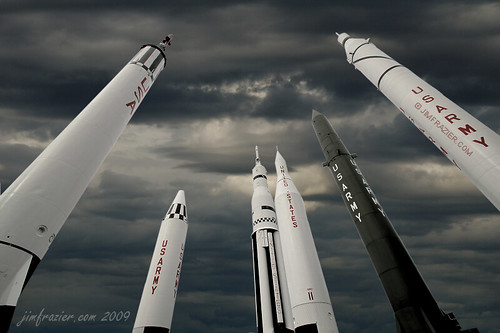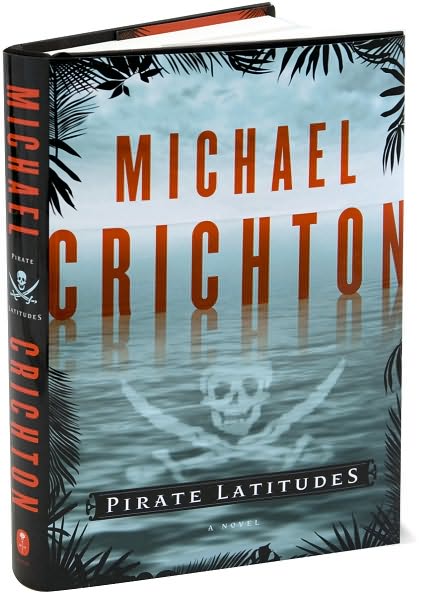
Now that it's close to the end of the year, it's time to look back, like everyone else and their mother on the internet, on the past year. 2009 has been a fantastic one for all things geek. There have been a number of fantastic movies, books, television shows and so forth, as well as a bunch of things that really didn't come off as well. Here's what I've been geeking out (or complaining about) this year:
The Best:
Moon
Moon is easily one of the best Science Fiction films that I've ever seen. Ever. It's been added to a very small list of films (The Fountain, Children of Men, Pan's Labyrinth, etc) of exceptionally conceptualized, produced and thoughtful SF/F films out there. Moon is one of two really good films this year that I really enjoyed and for a number of reasons. The story is fantastic, playing off of common themes with new eyes, it's visually stunning and it's a largely original story, one that's not based directly off of prior works. And, it has a fantastic soundtrack by Clint Mansell.
Star Trek
This appears three times on this list, because I'm still largely split over how I feel about it. The best parts of this is that it's a fantastic, visually stunning film, and really does what Enterprise and Nemesis failed to do: reboot the franchise in grand style, with over the top action, adventure, everything that really comes to mind when you think Big Budget Space Movie. The cast, pacing and visuals made this one of the most successful films of the year, and the best of the big budget films that came out this year.
District 9
When it comes to fantastic Science Fiction films, Moon and Star Trek didn't have a monopoly on this at all - District 9, coming out of San Diego Comic Con with an incredible amount of buzz and a good viral marketing campaign showed that there was still a place for an innovative filmmaker armed with a good story. The end result is a compelling take on first contact. Instead of an us against them, or invaders from outer space flick, we see refugees from outer space, with an acute political message that makes this movie even more interesting.
The Curious Tale of Benjamin Button
This was an interesting film, one that got a bit of press, but wasn't a blockbuster by any means. The story of a man who ages backwards from birth, one that proved to be a powerful and somewhat heartbreaking love story leaves much room for discussion, but at points, was slow and ponderous. Brad Pitt did a fantastic job, as did the special effects artists who provided the CGI throughout.
The Magicians, Lev Grossman
The Magicians was a book that came out of nowhere for me, until a Borders email let me know about it. Picking it up, with few expectations, I was enthralled with Lev Grossman's take on the fantasy world. Drawing much from C.S. Lewis's Chronicles of Narnia and elements of Harry Potter, this book looks at a boy in a magical academy in a far more realistic sense, injecting a good dose of post-college reality into a field that is often ripe with monsters and epic quests. A quest of sorts is in here, but the buildup is fantastic.
Wired For War, P.W. Singer
Wired For War is a book from earlier this year that looked at the developments of robotics in warfare. P.W. Singer takes a long and comprehensive look at not only the state of robots and their use in combat operations, but also looks to how the use of robotics is integrated into wartime planning, and how this impacts command and control structures already in place. From this point, he looks to the future of warfare, where robotics will go through the next decades and what the face of futuristic warfare might look like. It's also peppered with numerous Science Fiction references. I had a chance to speak with and interview Mr. Singer, who was extremely pleasant and eager to talk about his book, and write up several major articles for io9, which was a thrill as always.
The Windup Girl, Paolo Bacigalupi
Recently selected as one of Time Magazine's top books of the year, Paolo Bacigalupi's first novel, The Windup Girl is a stunning one. Taking place in the near future, in a world without oil, alternative energy has become paramount, while agricultural firms have put profit before common sense and as a result, plagues ravage the world, except for Thailand, whose isolationist policies hold back the outside world and its problems. The book covers a lot of ground, from governmental policy to corporate greed to bioethics, with a wide range of characters who all fall within a gray area. This book is fantastic, and if it doesn't win a Hugo, there's seriously something wrong with the world.
The Moon Reigns Supreme - 40th Anniversary of Apollo 11 & Water on the Moon
This year marked 40 years since 1969, when man first landed on the moon with Apollo 11, and with a successful follow-up mission with Apollo 12. Easily one of humanity's greatest accomplishments and it has been followed up with a number of projects. NASA found and restored footage of the landing and EVA activities, cleaning it up a little. NASA also took pictures from orbit of the Apollo landing sites, down to footprint trails with some stunning work from LCROSS.
In addition to NASA's efforts to celebrate the anniversary, there were a number of other things out there. The Kennedy Library launched the website 'We Chose the Moon', which documented, in real time, the Apollo 11 mission. I listened at the edge of my seat, following along with the mission transcript and listened as Neil Armstrong and Buzz Aldrin touched down on the lunar surface. Finally, Craig T. Nelson's book, Rocket Men: The Epic Story of the First Men On The Moon, was released earlier this year to also commemorate the mission, which proved to be a detailed and fantastic read, one that helped to influence my thinking on the lunar mission.
The Lunar landing wasn't the only press that the moon got this year - the LCROSS mission launched a component that slammed into the surface and let up a plume of debris - analysis revealed that there is water on the moon - a lot of it. And for all of those people who complained about this, keep in mind the number of craters that are already there.
Last servicing mission to Hubble.
NASA wasn't just in the news for Apollo 11; this year marked the last servicing mission for the Hubble Space Telescope, which has been in orbit since 1990. Despite its troubled history, the satellite has returned some of the most fantastic, beautiful and stunning images of the universe around us, and will continue to do so for a couple more years. Space Shuttle mission STS-125 was launched in May, where a new camera was placed onboard and several other minor repairs. The satellite is slated to continue operation through 2014, so don't fret yet.
James May's Toy Stories
James May, one of the three presenters on Top Gear, has been doing a limited TV show on classic toys, including Mecano, Plasticine, and eventually, Lego, looking a little at their history and then building something supersized out of them. It's quite a treat to watch.
Fringe
I called Fringe one of the worst things last year, but it's turned around for me. Picking up the boxed set, I was hooked. It's a bit cheesy, gory, but a whole lot of fun. Walter, weird science, teleportation and alternate universes make this show a huge joy to watch. Season 2 is proving to be just as good, now that they've locked down a story, and I'm eager to see where it goes.
Dollhouse
Dollhouse debuted earlier this year with a short, 13 episode season that started off slowly, but picked up an incredible amount of steam. While it's more uneven than Joss Whedon's earlier show, Firefly, Dollhouse's better episodes help make up for the slack by introducing some of the most challenging moments in Science Fiction, and deal with issues such as the soul, personality and consent, while also offering cautionary tales on the uses of technology. Unfortunately, with the show's cancellation right as it gets good, there's a limit to what can be told, but with plenty of time for this show to wrap up all the remaining storylines, I think that this will become a cult classic.
Battlestar Galactica
Where to begin with Battlestar Galactica? It's been a rush over the past six or so years, with a miniseries and four seasons of television and two movies, and like all good things, it had to end sometime. Fortunately, it ended when it was good, and while the finale garnered quite a lot of talk and dismay from some people (io9 listed it as one of the bigger disappointments), I think that it was carried off well, with a rich blend of religious allegory, action and a satisfying ending that few science fiction shows seem to get.
Kings
Sadly, Kings was another short lived show that was cancelled before its time. Taking the story of David and Goliath from the Bible and updating it in a modern, alternate world with inter-kingdom politics, faith and destiny. The stories were superb, well told, with a fantastic cast. This is precisely the type of show that should have been on SyFy, especially with their upcoming show Caprica.
Stargate: Universe
SyFy's latest show from the Stargate Franchise, Stargate: Universe is possibly the most interesting and compelling installment in the series. Taking the very basics of Stargate SG-1/Stargate Atlantis, this show takes more cues from Battlestar Galactica than it does Stargate. The result is a far more realistic show, with more personal stories and situations that are much darker, and more grown up from the first show.
Landing At Point Rain
The Clone Wars thunders on, with mixed results, but easily the best episode that's aired thus far is Landing At Point Rain. Taking influences from Black Hawk Down, Saving Private Ryan and other war movies, the show finally lives up to its title: The Clone Wars. There's plenty of action, less of the stupid lines and fantastic animation that really made this episode one of the most exciting moments in the entire franchise.
The Hazards of Love, by the Decemberists
The Decemberists have long dabbled in interesting and wordy music, as well as fantasy, with their last album, The Crane Wife, and The Tain, but The Hazards of Love is their most ambitious attempt at a concept album to date, one with an overarching story of Margaret and William, a town girl and a cursed man, their love for one another and the Forest Queen who conspires to keep them apart. The album is filled with supernatural elements, and seems to draw from Lord of the Rings and traditional mythic stories to put together one of their best works to date. The band in concert was also a treat to see.
Do You Want To Date My Avatar?
I'm not all that familiar with The Guild, but Felica Day's clever music video is hands down fantastic.
Dr. Horrible Wins an Emmy
Dr. Horrible’s Singalong Blog was one of the coolest things to come out last year, and this year, it received an Emmy, which helps to solidify the web as a growing platform for serious and professionally produced entertainment. Hopefully, its success will mean that we’ll see smaller, independent productions going online and succeeding.
Symphony of Science
Symphony of Science is a project that puts noted scientists (notably Carl Sagan) to music by using an auto tuner. The result is a series of music videos and songs that help to convey some of the beauty and wonder of physics though some fairly clever songs. I've been listening to them constantly, and as a sort of electronica style music, they're quite fun, and very geeky to listen to. Best of all, there is plans to make further songs.
Star Wars In Concert
One of the most iconic elements of Star Wars isn't just the action and epic story; it's the music that it's set to. For much of this fall, a travelling show, entitled Star Wars In Concert has been travelling around the nation. Unfortunately, it's winding down, but it will likely continue into next year. The 501st was called out at most of the events, and through that, I was able to watch the show. Combining a live orchestra, clips from the movies and narration from Anthony Daniels (C-3PO), the entire evening was a fantastic experience that gave me chills throughout.
Tauntaun Sleeping Bag
The Tauntaun Sleeping bag started out as an April Fool's Joke, but the demand and interest was so prevalent that ThinkGeek actually went out and made it. What a fantastic idea - I kind of want one.
Slingers
The final thing on this list is Slingers, a short conceptual teaser for a show that's heading towards production. The 3 minute teaser is easily one of the best moments in SF that I've seen in a while and I've been bouncing around, positively giddy at the prospect that this might be made. It's got humor, some interesting characters and a very cool look to the future. Plus, it's a space show, and there aren't many of those around now. It left me seeing more, and I'm sure that we'll see more in the next year or so.
Meh:
Fanboys
For all the hype, Fanboys was a bit of a letdown. The cancer story was kept in, but so were some of the immature and cheap laughs that brought the entire film down. It's good for a laugh, and there's a lot that went right with it, but still, I was left wishing that there was more to it, without the frat boy humor in it.
Watchmen
Don't get me wrong, Watchmen was stunning. It looked, felt and acted like the comic book that it was inspired by, and the transition to the screen worked fairly well. At the same time, for all the hype that there was here, I'm not that enthused to see it more than once or twice. It's still on my to get list, but it's not necessarily a priority. I think my biggest issue with this is that it's too much like the comic book, and that the drive to make everything exact harmed the overall production. It's less of a movie than it is an homage from the director. Sin City was the perfect comic book movie, this wasn't, and it really should have been. Still, it's worth watching.
Star Trek
Star Trek, one of the best, one of the eh, moments of the year. It looks and feels spectacular, but when you get down to it, there's the shoddy science, and an incredibly weak story that pulls the movie along. The story's really not what the film was about, this was a character start for more Star Trek, but for me, story is central to Science Fiction, and this just didn't have it.
9
The trailers for 9 looked great, and there was quite a bit of interest in this. I went into the theater with high expectations, and those were largely met - the film looked spectacular, and it was a fun ride, but the story and characters were pretty lacking. It needed quite a bit of story and character development that was needed, and that harmed the film. Plus, it didn't seem to know if it was a kid's movie or one for an older audience. This is probably something to rent, not to buy.
V
The new V should have been great - the cast, producers and network put together a good premise, but with the first couple of episodes sped through just about everything that made the show interesting. The themes of first contact, of a ship arriving over earth with a message for peace contain so much when it comes to religion, science and society, all rich territory that could be exploited, but instead, it's gone past too quickly, with crappy teenage romance storylines. I'll probably not pick up watching again, but I'll see what's going on in the show, in case, by some miracle, it's picked up for a second season.
The Prisoner
AMC's The Prisoner was another show that should have been great. The trailers presented a fantastic looking story of psychological stress with a weird desert backdrop, but honestly? I can't tell you what it was about. It was convoluted, unconnected and dull, and while it looked very pretty, and had some decent episodes, it was a pretty big letdown.
Spirit gets stuck in the mud
The Spirit Rover on Mars got mired down in a patch of sand earlier this year. Put into operation in 2004, and only intended for a 90 day mission, the rover was still going strong until it got stuck. Hopefully, the boffins over at the JPL will be able to get it out and about once again, although if I remember correctly, the last thing that they were intending to try was to back it out the way it came in. I would have thought that would have been the first thing to have tried.
Google Wave - lights are on, but there's nobody there.
Late this year, Google Wave got turned on, and like any major Google product with exclusive access, it was, well, popular. But nobody really seems to know what it's for, and unlike Gmail, which could be used as an e-mail client from day one, its limited access restricts a lot of what you can do with this. People aren't using it like e-mail if it was designed today; it's essentially a glorified Gmail chat window, or a really good business collaborative tool. Still, it's pretty nifty, and I really hope that they can integrate it into Gmail someday.
Worst:
G.I. Joe, Star Trek, Transformers, Terminator & Big Budget Crap
I know I've singled out Star Trek a couple times here, but more than ever, especially with far superior, low budget films competing with them this year, we see once again that tons of special effects doesn't necessarily equate to a good film. G.I. Joe landed with horrendous reviews, Star Trek had a smaller plot than a television episode and Terminator: Salvation was a huge disappointment, critically. (I thought it was decent, but nowhere near as good as the trailers led me to believe). My biggest gripe is extravagant use of CGI and an over-reliance on special effects for a dumbed down audience. Among other things, Moon and District 9 demonstrated that a good looking, intelligent film could be done for a fairly low cost, and I know that I'll be going back to those far more than the others. Still, big budget summer movies aren't going anywhere - a lot of these films made quite a bit, and the jury is still out on Avatar, which drops in a couple weeks.
Karen Traviss Quits Star Wars - Twice
Karen Traviss was really a shining star within the Star Wars Universe. Her first entry, Republic Commando : Hard Contact, was followed up by several very good novels, with some different and intelligent views on the Clone Wars. Then, there was a bit of a row over Mandalorians, causing her books to come into conflict with the Clone Wars TV series. Since then, there's been a bit of a row about this, and Traviss has left the universe for others, such as Gears of War and Halo, and hopefully, her other works. Karen explains everything here, and makes some good points. She will be missed, however.
Black Matrix Publishing Row
With harder times coming around, some publishers found a new revenue stream: aspiring writers who have little common sense. One notable SF ones was Black Matrix Publishing, called out by author John Scalzi recently on his blog, Whatever. While Scalzi had quite a lot of very good advice in his usual up front fashion, there were a number of people who went on the offensive and critizised him as an elitist writer, issuing some of the most ridiculous arguments for why Black Matrix had been wronged. I'm not necessarily involved in either side, but Scalzi presented a reasonable argument. Why is that so hard?
The ending to Life On Mars
I really got into Life on Mars. It wasn't as good as the UK version, but it was unique, interesting and divergent from it. While the show basically adapted the original show to a large extent at first, they had an interesting pace and storyline starting up, and far better than the first pilot that was shot, which was just terrible. The creators had a delicate balancing act to follow, and did a very good job with giving their characters their own personalities and stories that diverged from the UK version. Then, the show was cancelled and they ended it, and the last ten minutes of the show just dropped like a rock. Clunky, very, very poor production values that made me wonder if this was all slapped together at the last minute, and quite honestly, it dimmed the entire series for me, especially compared to the brilliance of the UK version. I'll watch the show again, but I'll be doing my best to forget about the conclusion.
SciFi becomes SyFy, nobody cares
One of the biggest furies of the year was when SciFi became SyFy, and the internet erupted into such indignation that I thought the world was going to end. Quite simply, the channel changed names to create a stronger brand, not change content, and so far, they seem to be doing pretty well, with Warehouse 13, Stargate Universe, Alice and presumably, Caprica doing really well in the ratings. All of which is good, for the network to expand further and really show that geek is really in right now. While the name looks silly, it's really a superficial change. Now, if they would just get rid of wrestling. Or pick up Slingers for five seasons.
Orbiting Carbon Observatory crashes - Mission Failure
This was a satellite that I tracked earlier this year while really watching the space stuff. The Orbiting Carbon Observatory was an expensive one, designed to monitor global carbon levels to get a better idea just how climate change is progressing and providing us with a very good look at just how the environment is changing around us. Ultimately though, part of the nose failed to separate from the capsule, and with the extra weight, the rocket crashed into the south Atlantic.
Heroes continues. Meh.
I've given up on Heroes, after the dismal decline in quality, storytelling and characters. They should have stuck with the original plan, and killed off the first season's cast when they had the chance, instead of bringing people back time and time again. The fact that ratings are declining is just stunning to me, especially now that the show is into it's fourth season, and I have doubts that it will return. Hopefully not.
FlashForward
Look, if I want to watch LOST, I'll watch LOST. I'm not going to watch a show that's a poor copy of it.
Deaths:
Every year, there are a number of deaths in the geek genre/fan community. A couple notable ones were Ricardo Montalbán, who played Kahn in Star Trek: The Wrath of Kahn, Michael Jackson, who's song Thriller places him on the Geek spotlight, Kim Manners (X-Files/Supernatural Producer), Philip José Farmer, author of Riverworld and numerous other SF books, Dave Arneson, one of the D&D co-founders, and Norman Borlaug, who saved the world through science. There are others I'm sure, but it's still hard to see people in the genre leave us forever.
Unknowns
A couple of unknowns for me include The Lovely Bones, Sherlock Holmes, Avatar and Zombieland, which I haven't seen, Deathtroopers, which I haven't read, and Halo ODST, which I haven't played. (Okay, haven't played much. I've liked what I've played. And the soundtrack. And the fact that the entire Firefly cast is somewhere in there)
What's coming up for next year? The new Tron movie is coming out, which I'm horribly excited for, especially after watching the trailer and then the old movie. Slingers is likely going to get some more buzz. Iron Man 2 will be big, as well as Clash of the Titans, Inception (Really want to see that one), Chronicles of Narnia 3, The Book of Eli, and Toy Story 3. Hopefully, Scott Lynch will have his third book out, and Caprica will be beginning (High hopes for that one), as well as the second half and second Season of Stargate: Universe. Who knows what else?


















